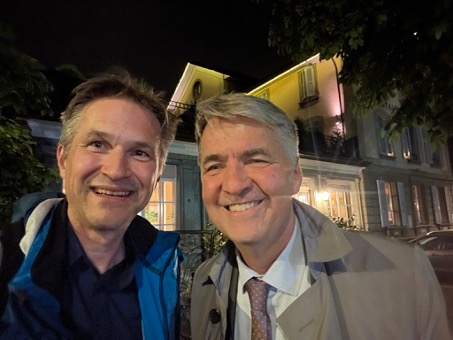Bern – ESI at the European Movement of Switzerland: Humane borders and the future of Europe

Gerald Knaus gave the keynote presentation at an event hosted by the European Movement of Switzerland titled “Humane Grenzen und die Zukunft Europas” – “Humane Borders and the Future of Europe.” In his presentation, Gerald noted the importance of actively defending the rule of law and democratic institutions in Europe.
This is no easy task, Gerald argued, pointing to the turbulence of recent European history. Wars from the Balkans in the 1990s to the Caucasus to the present Russian full-scale invasion of Ukraine have led to deep human suffering and mass displacement, with the war in Ukraine leading to a refugee crisis in Europe unprecedented since the end of the Second World war. Today, Serbia’s leaders threaten war in Kosovo, Azerbaijan’s leaders threaten an invasion of Armenia, and Russia’s leaders continue to escalate war in Ukraine – each of these poses grave risks to Europe and has the potential to trigger yet further suffering and mass displacement.
Gerald stated that this history of violence and rights abuses in Europe since the Second World war demonstrate the failure of existing legal structures to fulfil their founding missions of ensuring peace and human rights across the continent. In particular, Gerald pointed to the Council of Europe, noting its previous appeasement of authoritarian states such as Russia and Azerbaijan – appeasement that was often bought through corruption, as exposed by ESI in our report on Azerbaijan’s Caviar Diplomacy. At the same time, Gerald noted that Russia’s invasion exposed the depth of this strategy’s failure. This provides an opportunity for the Council to learn from past mistakes and live up to its founding mission. The recent suspension of the Azerbaijani delegation’s credentials – a decision which ESI pushed for – is a good first step in the right direction.
Gerald noted that the fact that the Mediterranean remains the world’s deadliest border is a further sign of the important work that must be done. He noted that we know paths to reduce deaths – such as the 2016 EU-Turkey statement. Gerald thus argued for a paradigm shift towards agreements with third countries, emphasising the urgent need for legal migration routes and international cooperation as ways to reduce deaths and ensure human rights. Drawing on successful models of integration from cities like Vienna, which have managed to transform migration into opportunities for growth and diversity, Gerald called for a renewed commitment to a migration policy that is not based on fear, but on laws, morality, and opportunity.

- ESI proposal: Safe Third Country Agreements
- ESI proposal: Guide to a Crime Scene - Azerbaijan and the Council of Europe: State repression and those who fight it
- Der Spiegel, Ruanda laut Migrationsexperte Knaus bereit für Flüchtlingsdeal mit Deutschland, ("Rwanda ready for refugee deal with Germany, according to migration expert Knaus"), 15 May 2024.
